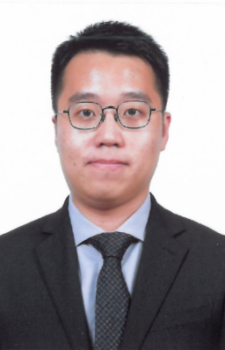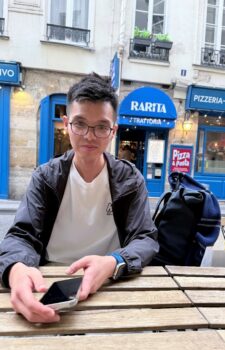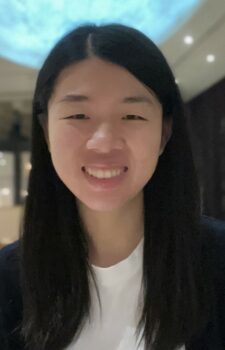畢業生分享
Alvin CHAN (2025 graduate, current Mathematics teacher at a secondary school)
Being a teacher means continuously learning, which inspired me to enroll in the MSc in Mathematics Education Programme. In the past two years, this exceptional programme provided me with abundant opportunities to deepen my understanding of mathematics learning and teaching, as well as to explore innovative teaching practices. Beyond the lectures, this programme also encouraged us to actively collaborate with our peers, fostering a vibrant professional network where we could exchange insights and best practices.
A distinctive feature of this programme was its unique three-component structure, which included mathematics, education, and mathematics education. This unique design of the curriculum not only deepened my pedagogical knowledge, but also allowed me to explore higher-level mathematics, as well as to gain a greater understanding of school administration and the science behind learning. Particularly, “MAED6164: Project and Research Report: Mathematics Education” empowered me to apply my learnings to real-world research and share my findings at an international conference. It was a truly transformative experience, allowing me to engage in cross-cultural exchanges with mathematics educators from around the world.
Overall, if you are a dedicated mathematics teacher seeking to elevate your practice by furthering your theoretical understanding, I wholeheartedly recommend this MSc Programme. The depth and breadth of knowledge it provided was truly unparalleled and I am grateful for being part of the community!


CHOI Shek Sing (2025 graduate, current Mathematics teacher at a secondary school)
The two-year Master of Science in Mathematics Education Programme provided me with valuable insights into contemporary mathematics teaching and learning. Through a well-rounded curriculum that covered three main components, I refreshed and deepened my knowledge of Algebra and Calculus. Collaborative group activities with fellow mathematics teachers from local schools allowed us to share challenges and reflect on effective and meaningful teaching strategies. I also developed key skills in conducting and evaluating educational research using both quantitative and qualitative methods.
A particularly valuable course, which focused on learning sciences and instructional implications, enhanced my understanding of how students learn. This enlightened me on how to design and organize lessons, learning materials, and assessments to achieve more effective learning outcomes. I am grateful to have the professional and supportive instructors who facilitated our experience with well-structured teaching materials, thoughtfully designed classwork, and comprehensive reference materials available online. Diverse learning activities, such as creating graphical representations of mathematical concepts, enriched the programme.
Balancing part-time studies with demanding teaching responsibilities required strong time management, as I committed two nights weekly for coursework. Strategic use of extended holidays, such as Chinese New Year and Easter, allowed me to adequately prepare for group projects and individual term papers.
Overall, my learning journey in CUHK was highly rewarding, which allowed me to blend theories with practical applications in my daily teaching. The collaborative group projects fostered professional learning communities, enabling richer and more meaningful mathematics instruction. I wholeheartedly recommend this MSc Programme to mathematics educators seeking professional growth.
MAN Wing Tak (2025 graduate, current Mathematics teacher at a secondary school)
As I stand on the threshold of graduation from the Master of Science in Mathematics Education Programme, I am filled with a deep sense of accomplishment and gratitude. This journey was transformative, equipping me with not only theoretical knowledge but, more importantly, the ability to translate those theories into effective classroom practice. Applying those theories, I designed engaging mathematical activities that fostered conceptual understanding and critical thinking among students. One example that stood out was the activity in which students had to make their own clinometers using simple stationery to estimate the height of our school’s flagpole by applying theories of trigonometry they learnt. By developing hands-on projects and reflecting on students’ responses, a dynamic process that bridged academic research and real-world teaching could be established. It also made mathematics and learning mathematics more meaningful.
Equally invaluable was the opportunity to connect with fellow educators who shared my passion for mathematics teaching. Within this vibrant learning community, I met kindred spirits – peers and mentors who inspired me with their dedication, creativity and commitment to educational excellence. Collaborating on projects and sharing classroom experiences broadened my perspective and reaffirmed the importance of ongoing professional dialogue. We supported each other through challenges and celebrated each other’s growth, forming bonds that I knew would last beyond graduation.
As I look ahead, I am eager to continue this journey, and am confident in my ability to design impactful mathematics experiences and to sustain by the support of a community devoted to nurturing mathematical minds.


WONG Pui Yan (2025 graduate, current Mathematics teacher at a secondary school)
The two-year Master of Science in Mathematics Education Programme at the Chinese University of Hong Kong provided a valuable opportunity for me to enhance my expertise in both mathematical content and pedagogy. This comprehensive Programme included courses across mathematics, mathematics education and education, allowing me the flexibility to select those that interested me most.
Through various assignments, a research project, and reflective practices, I developed a robust toolkit for designing effective and engaging mathematics lessons. These experiences also underscored the importance of aligning learning objectives with assessment methods and prompted me to continually refine my teaching strategies.
Collaboration was an important component of many courses in the Programme. Frequent classroom interactions with peers allowed us to discuss challenges, exchange innovative ideas, and co-create practical solutions. The supportive environment fostered by both instructors and classmates made balancing the demanding combination of full-time teaching and postgraduate study far more manageable.
Reflecting on this journey, I found that the Programme not only deepened my expertise in mathematics and pedagogy but also transformed my approach to mathematics education. I am now dedicated to making mathematics more engaging and meaningful, hoping that students will experience both achievement and enjoyment in their learning.
